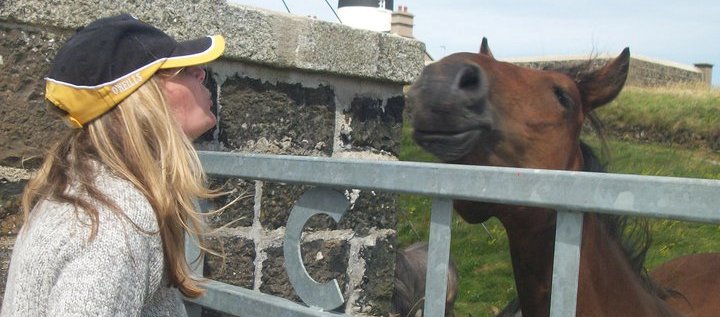
Author of 'The Birds That Never Flew', Thunderpoint. I work in the energising world of making television, telling stories creatively onscreen. I have an amazing son and daughter, both are beautiful, inspiring and engaging. My heart beats at its fastest when I'm at my home on Rathlin Island. Say hi on Twitter @MargotMcCuaig or at margotmccuaig.com
Sunday 2 December 2012
'all there is for now', gaelic and telling stories
I'm going to start with the last first.
Telling stories is integral to everything that I engage in personally and professionally, whether it is in conversation, making television, articulating an idea, writing a creative proposal or indulging in writing my own fiction.
And yet people don't really do it any more, not in the traditional sense of huddling around the fire and making elaborate conversation into the wee small hours with a wee story that is as embellished as the day is long.
I feel very blessed to have grown up, and into, an environment where talking was king, be it about football or ghost stories or the good old days of the past, my childhood was often spent amidst adult conversation, lost in endearing and often raucous chat that was the principal source of our evening's entertainment.
It makes my heart heavy when I watch people's eyes roll and sink at the prospect of listening attentively as an older person recounts a narrative which has connotations of some personal importance. It is often part of who they are; its arc the residue of everything that has constituted their very being. Yes, in traditional storytelling it is often exaggerated and its truth diminished as it is adapted to suit its audience, but it makes my heart jump with joy to watch a narrator pass on a skill that quite tantalisingly allows us to grow and develop and push on with some aplomb because we know how to structure a story arc and deliver a beginning, a middle and sometimes even an end.
Everyone should take a minute, or an hour, or even an evening when they get the chance and embrace a story delivered from the heart. It strengthens families and communities and explodes in time in the form of a burst of creativity in others, and goodness me where on earth would we be without that.
Like storytelling language is important, in its vernacular and in its various colloquialisms that allow people to engage with one another in words that build bridges and promote a kindred spirit of shared experience and togetherness. But we don't have to be part of the 'gang' to embrace language and culture that isn't deemed as our ‘own’.
I read with some disappointment recently a comment accusing an agency of "ghettoising" something because it was going to be delivered in the Gaelic language. It's an incredibly naive assessment to make. Gaelic is a beautiful language and it is available to everyone to enjoy. The language is expressive and poetic and hugely integral to the art of storytelling.
The fact that Gaelic is being showcased on its own channel on television and delivered in artistic ways means it is incredibly easy for a viewer to access, engage and should they so wish, understand the language. It is genius. Take football or rugby for example...
In this medium Gaelic can be celebrated and, for those with a desire to learn, comprehended. Watching football, a big rectangle space with familiar words and phrases repeated in easily identifiable areas of the 'painting by numbers' pitch is just lovely. How lucky are we to be able to pull two creative things together - football and Scotland's national language - and present it in an engaging and entertaining way.
I'm not a Gael but I'm embracing the language because it's bold and it's creative and its part and parcel of Scotland's heritage. I'm not fluent, I understand a wee bit, and sometimes to my amusement I find myself using Gaelic words in my head instead of the English equivalent. It's lovely. You can love it too. Come and join the Ceilidh. There’s a nice introduction to using the language on the Learn Gaelic website.
I'm writing a new novel, 'all there is for now' and wee tiny snippet - a whole 75 words - was published by paragraph planet recently. It's a creative website that publishes short fiction of exactly 75 words. It's not as easy as it sounds. Give it a try.
Subscribe to:
Post Comments (Atom)
No comments:
Post a Comment